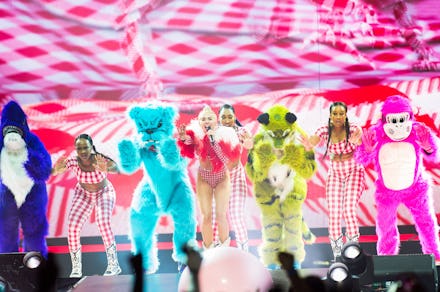Scientists Prove That Pop Music Is Literally Ruining Our Brains

Research proves what our parents have been saying all along: Modern pop music really is worse than older generations of pop music. Not only that, it has negative effects on your brain, too — if you're chiefly a pop music fan, you're likely to be less creative than any other kind of music lover.
But that says more about the industry than it does about you. Bad pop music is a harder habit to kick than you think. Kicking it, though, is way more important than you thought.
In 2008, Adrian North of Scotland's Heriot-Watt University published the largest study yet of musical taste, involving 36,000 people, 60 countries and three years of work. He asked each participant to rank their favorite genres of music. He discovered that the most common characteristic among all genre listeners was creativity. However, one group of listeners showed a genuine and significant lack of creativity: pop music lovers.
That doesn't necessarily mean that stupid people love pop — just that pop trains us to expect less from our artistic and creative lives. Music can nourish our minds like almost nothing else, so when a mega-industry is devoted to selling the least inspired music they can, they're short-changing all of us. A survey of other research on music reveals that pop music has gotten worse over the last 50 years. Not only that, it's been used to brainwash listeners through predatory marketing strategies across all media channels.
Pop music hasn't always been that way. Researchers measured the variety of words, chord variations and volume of songs across the decades sine the 1950s. Unsurprisingly, they found that modern pop is a watered-down version of what John, Paul, George and Ringo used to rock the charts with. Since the 1950s, vocal timbre — the character of the voice — has become less diverse and pitch content has become totally monochromatic (fewer chord and melodic variations), while everything has gotten much louder overall. Our popular music is literally being dumbed down.
This music isn't even music anymore; it's become a platform for inflammatory music videos that only detract from the musical experience or, in most cases, distract from the total absence of a genuine musical experience. People were talking about Nicki Minaj's "Anaconda" cover art way before the song dropped, and they only really discussed the song when the incendiary video followed. It's that culture that has music critics like Ted Gioia claiming that music criticism has devolved into lifestyle reporting. It's that culture that's rotting our minds.
Unfortunately, there's no end in sight. As these songs get watered down, they become cheap and easy fuel for the music business because they appeal to the lowest common denominator and thus reach a wide audience. That isn't a frivolous thing, though: Researchers have thoroughly documented that pop music is the "heavy equipment" of the adolescent years. It is far more influential than computers, television and movies in shaping how kids grow up.
That's why it matters when it's getting worse. Billboard charts fuel the mainstream market, identifying safe bets for movie soundtracks, commercials and background music, all of which ensure that a popular song is impossible to avoid. And despite common sense, songs aren't played because they are popular; they're played to make them popular.
If we care about our culture — and if we care about our minds — we'll vote with our ears. If the formulas stop paying off for the industry, we might get real music back into the mainstream.